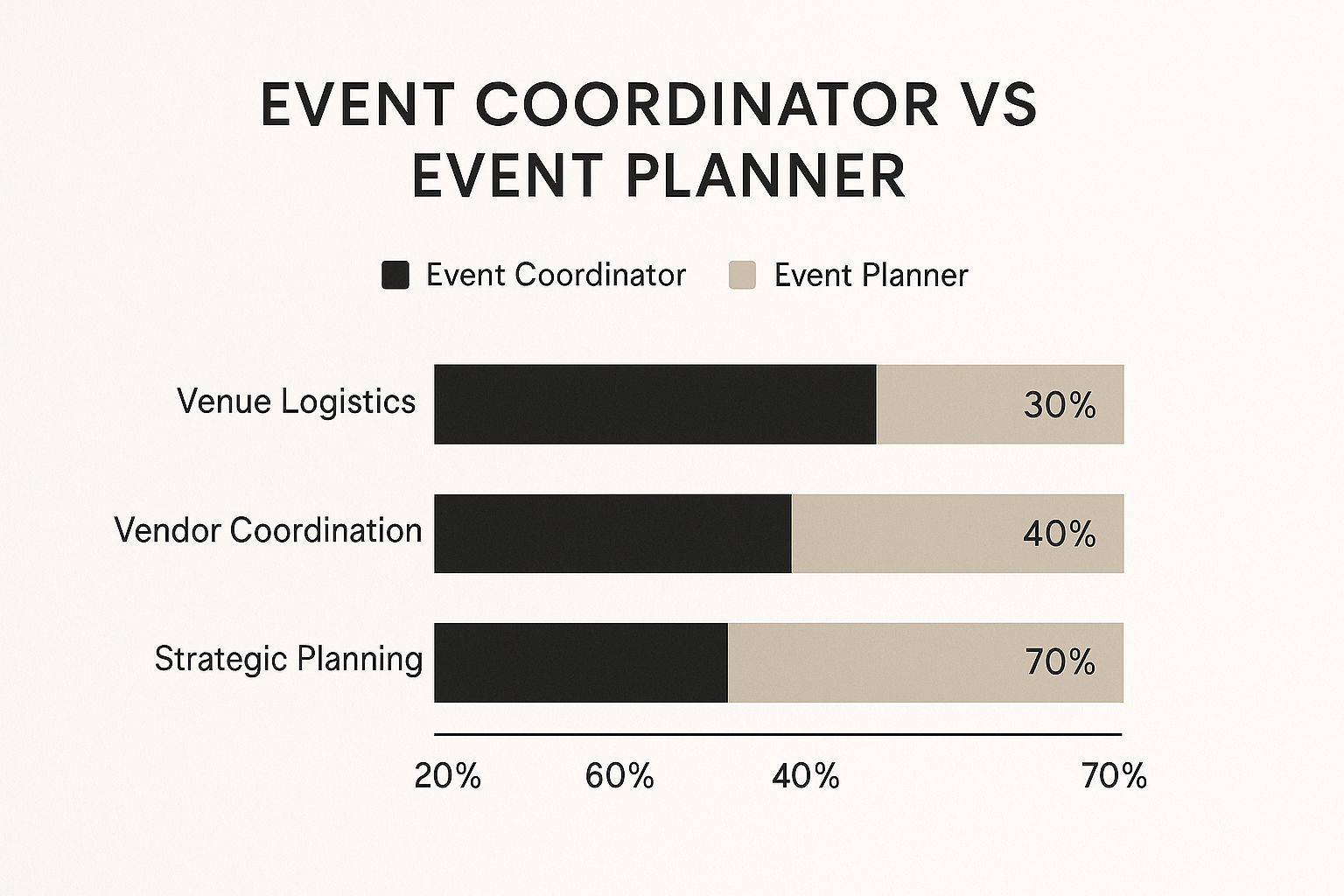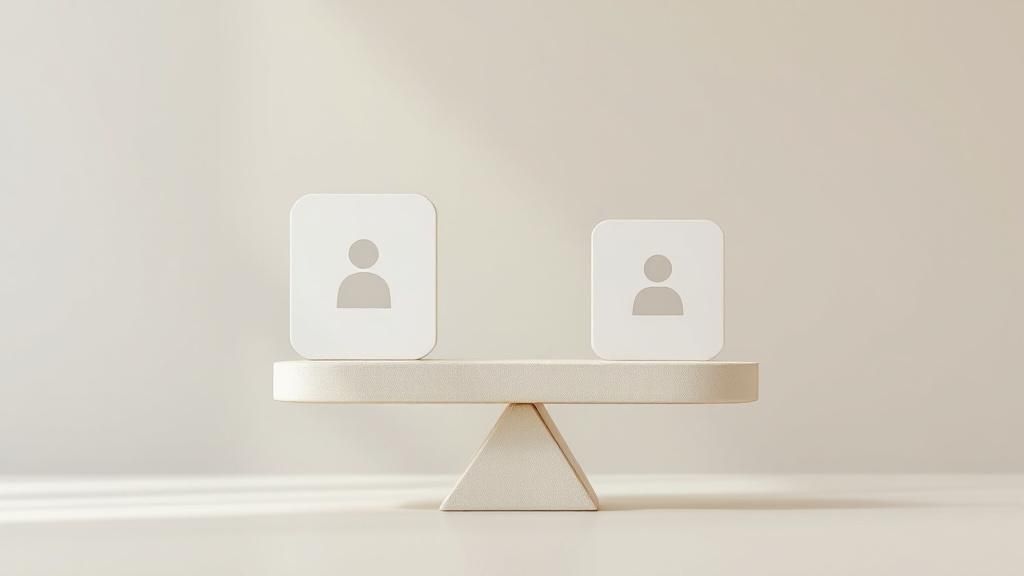Here’s the simplest way to think about it: An event planner is the architect designing the event from a blank slate, while an event coordinator is the general contractor on-site, making sure that design is built perfectly.
Are you looking for a visionary to create the blueprint, or do you need a logistics guru to manage the build-out on the day? That's the real question.
Planner vs. Coordinator: The Core Difference
When you're trying to get your head around the event planner vs. event coordinator debate, it really helps to think in terms of "big picture" versus "in the weeds."
An event planner is someone you bring on board months—sometimes even a year—before the event. They're your strategic partner, laser-focused on the what and the why behind your gathering.
This is a high-level, creative role from the very beginning. Planners are the ones who will:
- Brainstorm and lock down the event concept and theme.
- Build and manage the entire budget from top to bottom.
- Scout, negotiate with, and book the major players like the venue and caterer.
- Map out the entire guest experience, from the first invitation to the final thank you.
On the other hand, an event coordinator usually jumps in much closer to the event date, typically about four to six weeks out. Their world is all about execution and logistics—the how and the when. They take the detailed plan you (or your planner) have already created and make sure it unfolds seamlessly. Think of them as the masters of timelines, day-of vendor management, and putting out fires before anyone even smells smoke.
The Bottom Line: A planner dreams up the vision and books the big-ticket items. A coordinator takes all those moving parts and pieces them together flawlessly on event day.
To really nail down the difference, it helps to see their roles side-by-side.
At a Glance: Planner vs. Coordinator Roles
Here's a quick cheat sheet to see where each pro shines.
| Role | Primary Focus | Typical Timeline Involvement |
|---|---|---|
| Event Planner | Vision, Strategy, Budgeting, Vendor Selection | 6-18 months before the event |
| Event Coordinator | Logistics, On-Site Management, Execution | 1-3 months before the event |
Ultimately, you can see how both roles are absolutely essential for pulling off a great event; they just operate at different points in the journey.
Knowing these timelines and core responsibilities is the first step to figuring out who you need to hire. And no matter who you choose, getting everything in writing is non-negotiable. It’s always smart to see what goes into a professional event planning contract template to make sure all your bases are covered.
The Event Planner: Architecting Your Vision

Think of an event planner as the strategic mastermind behind your event. Their work starts way before the first invitation ever goes out, often with nothing more than a blank canvas and a rough idea. They are the visionaries who take a concept and turn it into a real, tangible experience.
This whole process kicks off by asking the big questions: What's the goal here? Who are we trying to reach? How do we want people to feel when they walk away? A planner's first job is to nail down these core objectives, as they'll steer every single decision that follows.
Building the Event Blueprint
Once the vision is clear, the planner gets into the nitty-gritty, focusing on the foundational pieces that make or break an event. This is where their connections, budgeting skills, and negotiation chops really shine.
A great planner will:
- Create and Manage the Budget: They don’t just track what you spend. They build a realistic financial plan from the ground up, figuring out how much to set aside for everything from the food to the DJ. This is how you make sure your vision can actually happen without any nasty financial surprises.
- Source and Select Key Vendors: Using their deep network of industry contacts, they’ll find the perfect venue, caterer, photographer, and other suppliers that fit your style and budget. They do all the legwork—the research, the vetting, and the first calls.
- Negotiate Major Contracts: A huge part of their job is getting you the best possible deals with vendors. Their experience protects your investment and makes sure every service is spelled out clearly in the contract.
Let's say they're planning a big corporate gala with a "Future Forward" theme. That early decision shapes everything. It leads them to a modern, tech-savvy venue, a caterer known for innovative food, and an experience built around interactive digital displays. For a wedding, picking a rustic barn venue right at the start sets the entire vibe, influencing the flowers, the music, and even what people wear.
An event planner is more than just an organizer; they are a creative and financial partner. Their strategic work in the early stages is the foundation upon which a seamless and memorable event is built.
From Concept to Cohesive Plan
Ultimately, a planner’s job is to create the master plan that an event coordinator will later bring to life. They’re focused on the big-picture stuff that defines the event’s identity. To get a sense of just how much they juggle, check out this comprehensive event planning checklist template.
Their creative input is also a game-changer, as they’re always full of unique ideas for themes and activities. If you need a spark of inspiration, our guide on fresh party entertainment ideas for adults shows the kinds of creative solutions a planner can dream up. In the event coordinator vs event planner debate, the planner is always the architect of the dream.
The Event Coordinator: Mastering On-Site Execution

If an event planner is the architect, think of the event coordinator as the director on set, bringing the script to life. Their work really kicks into high gear in the final month or two before the event, when the focus shifts from big-picture strategy to day-of execution. It's all about logistics, checklists, and putting out fires in real-time.
The coordinator’s job is to manage all the moving parts that have already been chosen. For example, the planner books the caterer, but the coordinator makes sure they show up on time, know where to set up, and start serving right on cue. Their entire goal is to make the day itself run like clockwork so the hosts and planners can actually engage with the guests.
The Heart of On-Site Logistics
At its core, an event coordinator's role is to turn the planner's vision into a reality on the ground. They become the central point of contact for all the confirmed vendors in the final weeks, making sure everyone is on the same page and knows exactly what to do and when.
This breaks down into a few critical jobs:
- Creating Run-of-Show Schedules: They build incredibly detailed, minute-by-minute timelines for the event day. This covers everything from when the first vendor arrives to when the last piece of equipment is packed up.
- Managing Event Setup: The coordinator is on-site directing the placement of tables, florals, AV equipment, and signage, ensuring it all perfectly matches the planner's floor plan.
- Directing Staff and Vendors: On the day of, they're the field general. If a vendor has a question or staff needs direction, the coordinator is the go-to person keeping everything moving forward.
Basically, the planner sets the stage, but the coordinator runs the show. It’s a crucial distinction. Planners are the visionaries working months out, while coordinators are the logistical pros who take that plan and execute it flawlessly once vendors are booked and the date is near. You can find more detail on this operational split in the event coordinator vs event planner discussion on PerfectVenue.com.
An event coordinator is your on-site insurance policy against chaos. They are the logistical commanders who ensure every planned detail happens exactly as it should, when it should.
Their expertise is what makes an event feel effortless to guests. When the DJ’s sound system glitches or a speaker is running late, the coordinator is the one calmly fixing it behind the scenes. This allows the host to stay present and actually enjoy their own event, knowing every detail is being handled. For any gathering with multiple vendors and a tight schedule, a coordinator isn't just a nice-to-have—they're essential.
Comparing Key Responsibilities Side by Side
On the surface, it’s easy to get event planners and coordinators mixed up. Both are essential to making an event happen, but their roles are distinct. Think of it this way: the planner is the architect who designs the blueprint, while the coordinator is the on-site builder who brings that blueprint to life.
To really get to the heart of the difference, we have to look past the titles and zoom in on the specific tasks. It’s in the nitty-gritty details that you'll discover who you truly need to hire for your event. The biggest clue? The timeline. A planner's work is almost entirely front-loaded, while a coordinator's world revolves around the days leading up to and including the event itself.
Diving Into the Details
Let’s get practical and look at how they each tackle three critical parts of any event: budgeting, vendor management, and putting out fires.
When it comes to the money, a planner creates the entire financial strategy. They build the budget from the ground up, figuring out how much to spend where. For a nonprofit gala, for instance, the planner sets the fundraising targets and cost ceilings. If you're looking for more tips on that, we have a great guide on how to raise funds for charity.
The coordinator, on the other hand, works within the budget the planner created. They're the ones on the ground managing petty cash, tracking day-of expenses, and making sure last-minute vendor payments are handled correctly so nothing goes over budget.
This image really helps visualize where their focus lies.

As you can see, the planner’s time is all about the big-picture strategy. The coordinator is completely immersed in the logistical execution.
Detailed Task Breakdown Planner vs Coordinator
To make this crystal clear, let's put their duties side-by-side. This table breaks down who does what from the moment an idea is born to the very end of the event.
| Task Category | Event Planner's Responsibility (The Architect) | Event Coordinator's Responsibility (The Builder) |
|---|---|---|
| Budgeting | Creates the overall budget, sets financial goals, and allocates funds across all categories. | Tracks on-site spending, manages petty cash, and processes final payments to vendors on the event day. |
| Vendor Management | Researches, interviews, negotiates contracts with, and books all major vendors (venue, caterer, entertainment). | Serves as the main point of contact for confirmed vendors, creates the master timeline, and directs them on-site. |
| Problem-Solving | Develops contingency plans for major risks (e.g., bad weather, low ticket sales) months in advance. | Handles immediate, on-the-ground issues like a vendor running late or an equipment malfunction. |
| Guest Experience | Designs the overall guest journey, from invitations and registration flow to the event theme and atmosphere. | Executes the guest experience by managing check-in, directing guest flow, and ensuring attendee comfort. |
This isn't just about job titles; it's about two professionals working in tandem to pull off a seamless event. The planner lays a rock-solid strategic foundation, and the coordinator ensures everything built on top of it stands strong on the big day. They truly are two sides of the same coin, each playing a vital, but very different, role in the process.
When to Hire a Planner vs. a Coordinator
So, who do you actually need? A planner or a coordinator? The answer boils down to one simple question: How much of the groundwork have you already done?
Figuring this out will point you straight to the right person. It's not about which role is "better," but who fits what you need, right now.
Think of it like building a house. Do you need an architect to dream up the blueprints from scratch? Or do you already have the blueprints and just need a sharp general contractor to manage the build-out on-site? This little analogy is the best way I know to explain the difference.
When an Event Planner Is Your Best Bet
You should be looking for an event planner if you're basically at square one with just a vague idea. They are the strategists you bring in when the path forward is a total blank slate.
Hire a planner if this sounds like you:
- You're Starting from Scratch: You've got the "what" (a conference, a wedding) but none of the "how" (no venue, no vendors, no budget). A planner will grab your vision and build the entire event framework from the ground up.
- You're Tackling Something Big and Complicated: Think multi-day conferences, massive weddings, or intricate corporate launches. These events have a million moving parts, and planners are pros at managing that kind of complexity from 30,000 feet.
- You Need Help with Budgeting and Vendor Connections: Don't know what things are supposed to cost? No idea who the good, reliable vendors are? A planner's financial know-how and little black book are worth their weight in gold. They often save you money through their established relationships and negotiation skills.
A perfect example is a tech company gearing up for a major product launch. They'd hire a planner months ahead of time to lock down the event's goals, find a venue with the right vibe and tech, and secure industry speakers. If you want to dive deeper into that kind of long-range thinking, our guide on how to plan a corporate event is a great resource.
A planner is your person when you need someone to figure out the "what," "why," and "who" of your event. They’re absolutely essential for turning a big idea into a real, workable plan.
Bottom line: if you need someone to manage the whole shebang from concept to completion, a planner is where you start.
When an Event Coordinator Is the Perfect Fit
On the flip side, an event coordinator is your go-to when you've already done the heavy lifting and just need an expert to make sure everything comes together perfectly. They are the logistics gurus who jump in closer to showtime.
Hire a coordinator in these situations:
- You've Already Booked Your Key Vendors: The contracts for your venue, caterer, and DJ are signed and sitting in a folder. Now you need someone to wrangle them all and ensure they work as a cohesive team.
- You Just Need Someone to Run the Show on the Day: Your main worry is making sure the actual event runs like a well-oiled machine, without you having to play director. A coordinator is that on-site point person for absolutely everyone.
- You Have the Plan but Need Flawless Execution: You’ve happily done all the planning yourself, but now you want to actually enjoy your own party. A coordinator will take your detailed notes and bring them to life.
Let's say you've planned your own 50th birthday bash—you booked the band, picked the menu, and sent the invites. A "day-of" coordinator is the perfect hire to finalize the timeline, manage all the vendor arrivals, and put out any fires so you can actually hang out with your guests.
The Hybrid Approach: A Winning Combination
For many big or high-stakes events, the real answer isn't choosing one or the other—it's hiring both.
In this setup, the planner architects the vision and secures all the major pieces. Then, about a month or two out, a dedicated coordinator joins the team. Their sole focus is on the nitty-gritty, on-the-ground logistics. This frees up the planner to keep their eye on the big picture while the coordinator ensures every single detail is executed perfectly when it counts.
Getting to Know the Pros Behind the Scenes
Titles are one thing, but who are the actual people bringing events to life? The event industry is a magnet for a certain type of person—someone who's incredibly organized, thrives under pressure, and has a real creative spark. This is true whether they're mapping out the big picture or managing the chaos on the ground.
To really get a feel for the industry, it helps to look at the numbers. In the U.S. alone, there are over 33,000 event planners and coordinators. It's a field dominated by women, who make up a whopping 69.5% of the workforce. The average age you'll find is around 38 years old, meaning you're often hiring someone with a good mix of energy and experience.
A Snapshot of the Industry
When you look at the ethnic breakdown, the field is primarily made up of White professionals at 61.8%. After that, you'll find Hispanic or Latino pros at 16.2%, Black or African American at 11.2%, and Asian professionals making up 5.9%. It paints a picture of a diverse group of people dedicated to their craft.
These aren't just logistical wizards; they're creative partners. Understanding a bit about who they are helps you appreciate the expertise you’re bringing on board to protect your vision.
At the end of the day, no matter their background, both planners and coordinators are wired with a passion for creating incredible experiences. Whether you're brainstorming some unique corporate event ideas for 2025 with a planner or just trying to nail down the final run-of-show with a coordinator, you're working with a specialist whose entire job is to make your event a success.
Common Questions About Hiring Event Professionals

When you're trying to choose between an event planner and an event coordinator, a few final questions usually pop up. Let's get those cleared up so you can hire the right pro with total confidence.
Can One Person Be Both an Event Planner and Coordinator?
Yes, absolutely. In fact, many seasoned pros offer "full-service planning" that covers everything from the initial brainstorming all the way through to the on-site management.
The key here is to get it in writing. Be crystal clear in your contract about the scope. If you sign on for day-of coordination, don't expect them to have handled vendor contracts or your budget six months prior.
Which Role Is More Expensive to Hire?
Nine times out of ten, the event planner will be the bigger investment. Their fee reflects months of deep, creative, and logistical work, from designing the look and feel to negotiating with a dozen different vendors. It’s a huge undertaking.
Most planners charge a percentage of the total event budget—usually somewhere in the 15-20% range—or a substantial flat fee. A coordinator, on the other hand, is focused on a much shorter window, so their pricing is typically a more straightforward flat fee for their time leading up to and on the day of the event.
Key Takeaway: Think of it this way: a planner is a long-term investment in your vision from start to finish. A coordinator is a targeted investment in making sure the day itself runs without a hitch.
Do I Really Need Either for a Smaller Event?
It really comes down to complexity, not just size. A super casual backyard BBQ? You’ve got this. But what about a 50-person anniversary party with a caterer, a DJ, and a rental company?
That's where a day-of coordinator is worth their weight in gold. They let you actually be a host and enjoy the party instead of running around telling the caterer where to set up.
At 1021 Events, we live and breathe both the big-picture vision and the nitty-gritty details. Whether you need a strategic partner to build your event from the ground up or an on-site pro to guarantee a smooth-running day, we're here to bring it to life. Explore our services and let's create something unforgettable together.




